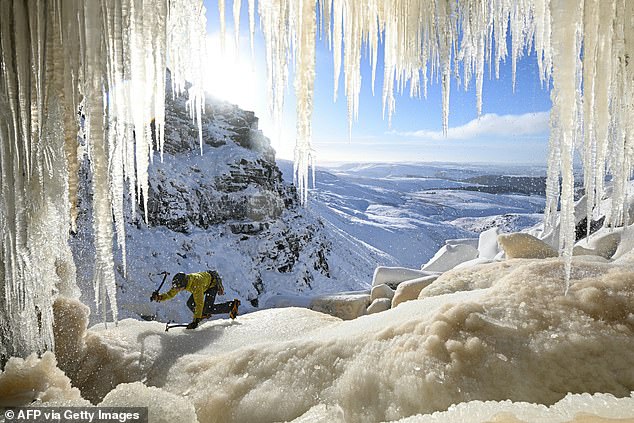On a bright winter’s morning, one intrepid climber braved the cold to enjoy magical scenes over the Peak District from a frozen waterfall.
But Britons have been warned not to venture outside in some parts of the country – where temperatures are set to drop to as low as -20C this weekend.
The country experienced its coldest January night for 15 years overnight into Thursday as temperatures fell to nearly -15C .
And the Arctic spell will continue, with cold weather health alerts extended by the UK Health Security Agency (UKHSA) until Tuesday.
NHS trusts have advised people against going out in the early morning or late at night when ice is at its thickest.
Dr Agostinho Sousa, of UKHSA, said an amber cold weather alert covering the whole of England would be extended, adding: ‘This weather can have a serious impact on the health of some people, including those aged 65 and over and those with pre-existing health conditions, and it is therefore vital that we continue to check in on friends, family and neighbours that are most vulnerable.’
The AA also advised against ‘all-but essential travel’ in areas worst affected by snow and ice, and urged drivers to take ‘extreme caution’ on hazardous roads.
Thursday night was the second in a row to record the coldest temperatures of the winter, falling to a low of -14.5C (5.9F) at Altnaharra, in Sutherland, in the Scottish Highlands.
In England, the coldest place was Shap, Cumbria, recording -11.5C (11.3F).

An ice climber ascends Kinder Downfall, a frozen waterfall in the Peak District National Park, near Hayfield, in north-west England

One intrepid climber braved the cold to enjoy magical scenes over the Peak District from a frozen waterfall on January 10

An ice climber ascends Kinder Downfall, a frozen waterfall in the Peak District National Park, near Hayfield, in north-west England
Meteorological Office spokesman Oli Claydon said of last night’s weather: ‘It will be another cold night with temperatures as low as minus 15C in the Scottish Highlands. There’s a chance we could even see the coldest night of winter again.’
Some experts predicted temperature could fall even lower – with the BBC reporting that -20C (-4F) was possible last night in upland areas blanketed by up to a foot of snow in northern England and Scotland.
Mr Claydon said last night was expected to bring ‘the last of the really low temperatures, with milder weather coming in during the weekend’.
He said: ‘This will spread from the north down to the south and it could be Monday or Tuesday before the south west starts to feel the milder temperatures.’
Although a widespread frost is likely tonight SAT, clouds are due to come in from the west which should prevent temperatures dropping as rapidly, he added.

Heavy snow has covered much of the UK in recent days. Pictured is Saddleworth’s High Street

Freezing conditions have seen Britain hit by snow storms, with temperatures in some areas plunging to a bitter -17C (pictured is snow covering a vehicle in Buxton on Thursday)

Hardy wild swimmers in Avon Lagoon in West Lothian, take the plunge in freezing waters on Friday morning – after smashing their way through the ice, first
Mr Claydon said: ‘Sunday will still be a chilly one, but not as cold as what we’ve seen for today and for tomorrow.
‘By Monday, we are expecting the temperatures to come back up to what we would expect for this time of year, which is around sort of 7C (or) 8C.’
Meanwhile, the Environment Agency has urged people to remain vigilant following recent flooding, with combined rainfall and snowmelt potentially contributing to continued river flooding in some parts of the country.
Minor flooding along the River Trent was expected to continue on Friday, while new impacts were possible but not expected along rivers in parts of the Yorkshire and the Humber regions on Monday and Tuesday.
As of 12.30pm on Friday, there were 20 flood warnings, meaning flooding was expected, and 67 flood alerts, meaning flooding was possible, in place.
The Environment Agency said people in affected areas should follow advice from emergency services, particularly while travelling.
Snow and winds have also brought rail disruption this week, with some lines forced to close.
National Rail said on Friday morning that some Southeastern services to and from London and Charing Cross had been affected by ice.
Manchester Airport closed both its runways on Thursday morning ‘due to significant levels of snow’ but they were later reopened.
Transport for Wales closed some rail lines in the country due to track damage following a period of ‘heavy wind, rain and snow’.
Hundreds of schools in Scotland and around 90 in Wales were shut on Thursday.
The UK Health Security Agency (UKHSA) has extended its cold weather health alert for all of England until Tuesday.
Amber alerts have been extended and will now run until January 14, meaning a rise in deaths is likely, the agency said.
It comes as the owner of British Gas warned on Friday that UK gas stores had fallen to ‘concerningly low’ levels amid the freezing cold temperatures.
Centrica said the UK now has less than a week’s worth of demand for gas in store.
On Thursday, stocks at UK gas storage sites were 26% lower than the same period last year, leaving them about half full, the energy giant said.
But a spokesman for Number 10 said the Government was ‘confident we will have a sufficient gas supply and electricity capacity to meet demand this winter, due to our diverse and resilient energy system’.
The spokesman added that reports the UK has been on the verge of an energy blackout are ‘not true’.
Gas inventory levels have come under pressure from the cold weather conditions and the end of Russian gas pipeline supplies through Ukraine at the end of last month.
Natural gas accounted for 53% of power in the UK on Friday, according to National Grid data, with renewables meeting just 16% of the country’s needs.
The UK has among the smallest amount of gas storage of any major European countries, with capacity to hold enough gas for 12 average days or 7.5 peak winter days.
Germany has enough for 89 days, France has 103 days and the Netherlands 123 days.
Centrica boss Chris O’Shea said storage levels are “concerningly low”.
He said the clean energy transition would mean the UK needs to use more energy storage systems to help meet demand.
“We are an outlier from the rest of Europe when it comes to the role of storage in our energy system and we are now seeing the implications of that.
“Energy storage is what keeps the lights on and homes warm when the sun doesn’t shine and the wind doesn’t blow, so investing in our storage capacity makes perfect economic sense.
“We need to think of storage as a very valuable insurance policy.”
Centrica operates the country’s largest gas storage site, Rough, a facility under the North Sea off the east coast of England.
Despite being full ahead of winter, current gas inventory at Rough is about 20% lower than at the same time last year, the company said.
Centrica is looking for fresh help from the Government to fund a multibillion-pound investment to increase the site’s capacity.
Source link






